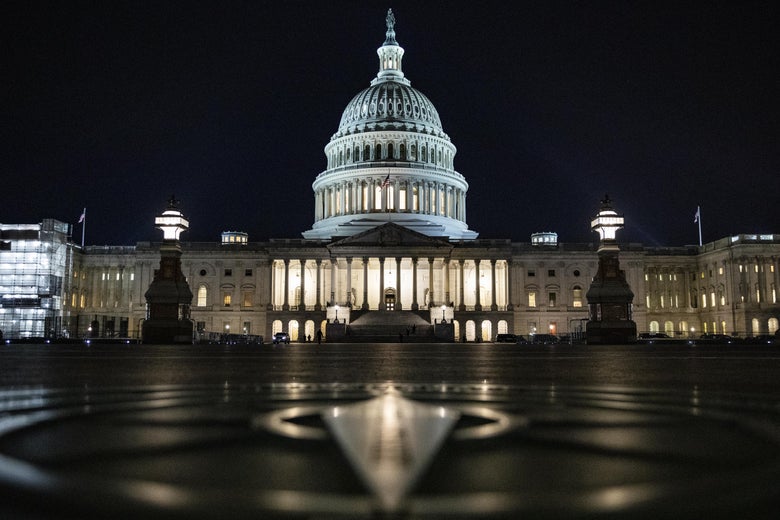
A view from outside the Donald Trump-less Senate impeachment trial of Donald Trump.
Samuel Corum/Getty Images
The second-phoniest thing about President Trump’s defense in his Senate impeachment trial is his lawyers’ persistent claim that, without direct knowledge of the president’s inner thoughts and intentions, it is impossible to conclude that there was anything wrong about his secret effort to unlawfully block foreign aid to Ukraine to extort personal political favors from its government. This line of defense has required the lawyers to ask the senators to imagine ever more improbable hypothetical versions of Donald Trump: a Donald Trump with a deep and long-standing interest in fighting corruption in post-Soviet politics, a Donald Trump gravely concerned about the appearance of conflicts of interest for American officials and their families, a Donald Trump sincerely committed to eradicating any threat of foreign interference in our country’s future elections.
All of these imaginary Trumps, and their pretend motives, are impossible to square with either the facts of the Ukraine scheme or the known record of Donald Trump. Yet there’s an even more basic problem with this defense, a still more fundamental fact about the impeachment inquiry that everyone—the president’s defenders, the House impeachment managers, the Senate, and the press—has evidently agreed to ignore: There’s a real-life Donald Trump to ask.
Would Trump answer questions about his Ukraine motivations? Almost certainly not! But somehow, in the course of the past four and a half years, everyone tacitly agreed to give up and not even try. Presidential candidates were supposed to share their personal financial records, until this one refused to. He was going to do it later, supposedly, after an alleged audit was done, but nobody could even get him to prove the audit existed and later never came. The Department of Justice told Robert Mueller that the president was immune to criminal prosecution, and so Mueller decided not to even try to subpoena the president for information in a criminal investigation.
Now the president has stonewalled the House’s oversight and impeachment inquiries alike, leaving the House trying to convince an unwilling Senate majority to vote to begin considering whether to ask anyone else about anything. John Bolton, maybe? John Bolton says he was in the room with Trump when he cooked up the Ukraine plot. But another person who was in the room is: Donald Trump.
The president’s defense team has dragged the impeachment trial into endless philosophical circles around the question of the president’s state of mind, which they claim to be fundamentally unknowable. There may be transcripts of his remarks, or people who heard or overheard his orders, or people who heard from his henchmen about what he wanted, but what if all of that is a web of misunderstandings? Who can ever really know the inner purposes of one man?
Did Donald Trump ever raise a complaint about Joe Biden’s public efforts to fight corruption in Ukraine before Biden entered the presidential race? Ask him! Did Trump withhold foreign aid because he was sincerely trying to pressure Ukraine to reform its culture of corruption? Seems like something Trump could answer! Why did Trump decide to fire the American ambassador to Ukraine? Trump would know! What did Trump mean when he told the president of Ukraine “I would like you to do us a favor, though”? No point in senators parsing the text among themselves when the person who uttered it is right there down the Mall! It’s not as if the president is reticent on these subjects. He tweets about them or free-associates around them in his rallies and public remarks. He’s just avoided talking about them in any setting where he will be responsible for the answers.
This is not how things have gone before now. Presidents have been expected to answer questions about their misconduct, and they have done it. Richard Nixon answered investigators’ questions about Watergate. Ronald Reagan answered investigators’ questions about Iran-Contra. Bill Clinton answered questions about his extramarital affair—and he got impeached because he lied about it.
Yet no one seems to believe that Trump can be asked to do the same. He tells lies all day long, but nobody will dare him to make the leap to official perjury. The Senate goes about the business of avoiding its business, with the majority groveling and the minority sunk into learned helplessness. To his loyalists, Trump is the supreme and unitary executive, his word as authoritative as God’s but also as ineffable and unknowable. To his opponents, he is impossible, so dishonest and belligerent and contemptuous of his duties that there is no point in treating him as a normal president, with the obligations that go with the job. Either way, they agree with the ultimate premise of Trumpism, which is that the president functions as a one-way broadcast machine, haranguing everybody and answering to nobody. The expectations of him are so low, there’s no limit to what he can do.
Readers like you make our work possible. Help us continue to provide the reporting, commentary and criticism you won’t find anywhere else.
Join Slate Plusfrom Slate Magazine https://ift.tt/2vC10nB
via IFTTT
沒有留言:
張貼留言